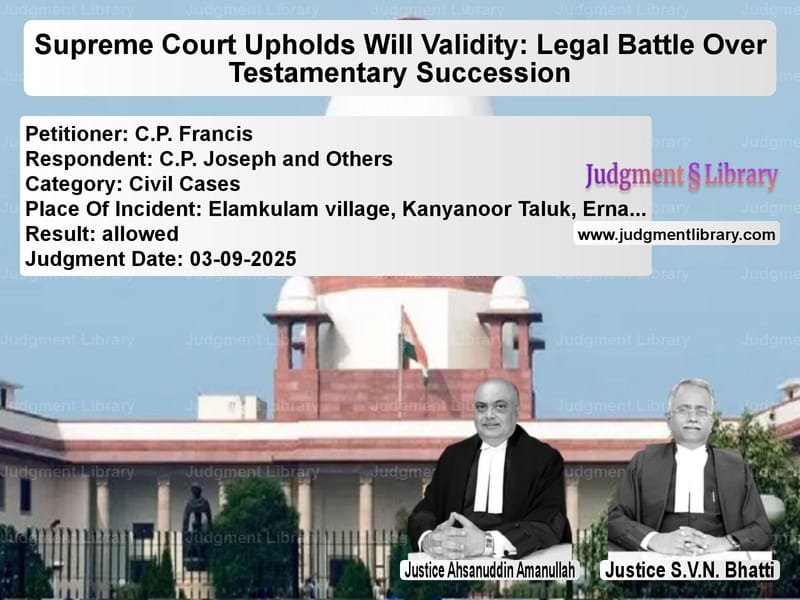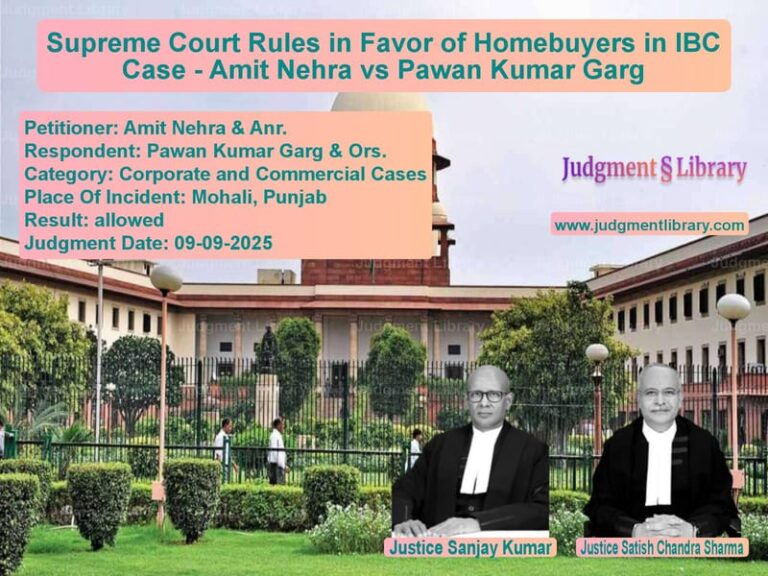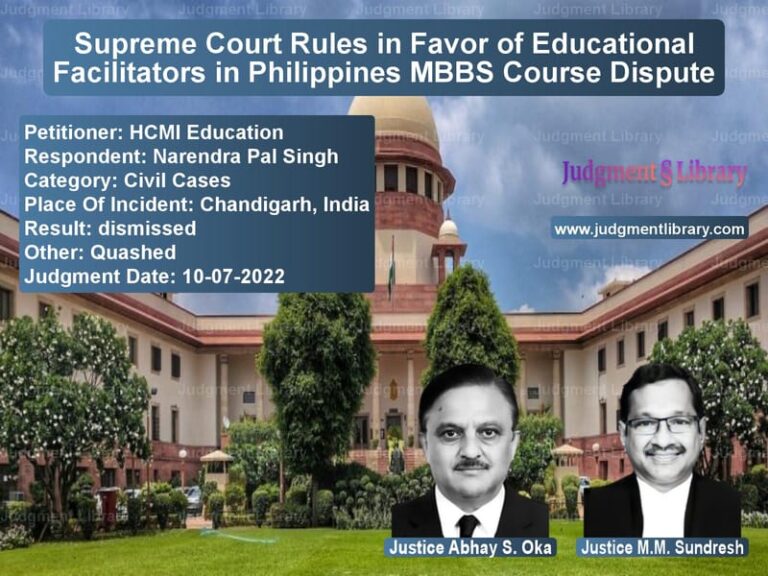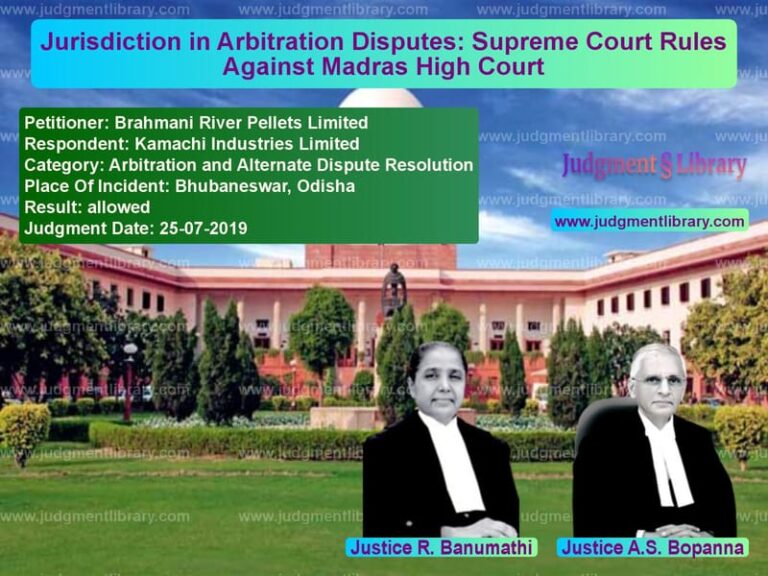Supreme Court Upholds Will Validity: Legal Battle Over Testamentary Succession
In a significant ruling that underscores the sanctity of a testator’s last wishes, the Supreme Court of India recently delivered a judgment in the case of C.P. Francis versus C.P. Joseph and Others. This legal saga, which spanned over a decade, revolved around the validity of a joint will executed by an elderly couple, CR Pius and Philomina Pius, and the subsequent attempts by their other children to nullify it, seeking a partition of the family property. The case journeyed from the Munsiff Court in Ernakulam to the High Court of Kerala, and finally to the apex court, presenting complex questions of law concerning testamentary succession, the procedural limits of second appeals, and the interpretation of a century-old legal provision.
The heart of the matter lay in a registered joint will dated January 27, 2003, executed by Pius and Philomina. Through this will, they bequeathed their properties, detailed in the plaint schedules A and B, to their son, C.P. Francis (the appellant). The will also stipulated that Francis was to pay specific monetary sums to his siblings within five years of both parents’ deaths. The parents passed away in 2004 and 2008, respectively. However, instead of accepting the testamentary disposition, the other children—respondents 1 to 5—filed a suit for partition, claiming that their parents had died intestate and that the will was a product of fraud and undue influence, executed while their father was in a poor mental state.
The Trial Court and the First Appellate Court both dismissed the suit, upholding the validity of the will. They found that the testators were of sound mind, the execution was proper, and the attestation complied with the law. The courts concluded that the properties were not partible and that the other legal heirs were only entitled to the monetary legacies mentioned in the will.
However, the Kerala High Court, in a surprising turn of events, allowed the second appeal. It framed an additional substantial question of law concerning Section 67 of the Indian Succession Act, 1925. This section renders a bequest void if an attesting witness or their spouse is a legatee under the will. Noting that one of the attesting witnesses, Ponsy (DW5), was the wife of the main beneficiary, C.P. Francis, the High Court declared the bequest void, effectively setting aside the will and opening the door for intestate succession. This decision prompted Francis to appeal to the Supreme Court.
The Core Legal Dispute in the Supreme Court
The Supreme Court, comprising Justices Ahsanuddin Amanullah and S.V.N. Bhatti, identified two primary points for consideration. The first was whether the High Court was correct in invoking its power under the proviso to Section 100(5) of the Code of Civil Procedure (CPC) to frame and decide upon an additional question of law based on Section 67 of the Indian Succession Act. The second point was whether Section 67 was indeed attracted to the facts of this case.
The appellant, C.P. Francis, argued vehemently that the High Court had overstepped its jurisdictional boundaries. His counsel contended that the case was admitted on specific substantial questions of law raised by the respondents, which primarily challenged the testators’ mental capacity and the genuineness of the will. The new question regarding Section 67 was introduced by the High Court suo motu at a late stage. This, the appellant argued, created an entirely new case that he was not prepared to meet. The original pleadings and evidence were centered on factual challenges—fraud, undue influence, and mental incapacity—not on the legal identity of the attesting witnesses.
The appellant’s counsel argued, “The impugned judgment exceeded the jurisdictional limitation of Section 100 of the Civil Procedure Code, 1908.” He further stated, “The additional question of law was framed without any basis in the pleadings or evidence, and was not even put as a suggestion to the witnesses.” He emphasized that the concurrent findings of fact by the lower courts on the valid execution and sound disposing mind of the testators were unassailable. The High Court’s decision, he claimed, granted a new prayer based on entirely new reasoning, which was procedurally impermissible at the second appeal stage.
On the other hand, the respondents, represented by Mr. Mathai M. Paikaday, defended the High Court’s action. They argued that the power to frame an additional substantial question of law is explicitly provided under Section 100(5) of the CPC. They maintained that the court had given the parties an opportunity to address the new question and that there was substantial compliance with the procedural requirements. On the merits of Section 67, they argued that the provision is clear and mandatory: if an attesting witness or their spouse is a beneficiary, the bequest is void. They pointed out that this law has been on the statute book for a hundred years and its consequences must follow when the circumstances are satisfied.
Adopting these arguments, Advocate Akshay Sahay added that the other attesting witness was also the son-in-law of the testators, further complicating the attestation. However, the core of the respondents’ position was that the will was void ab initio due to the operation of law, regardless of the testators’ intentions.
The Supreme Court’s Analysis and Key Arguments
The Supreme Court delivered a meticulously reasoned judgment, ultimately setting aside the High Court’s ruling. The court’s analysis focused heavily on the procedural propriety of the High Court’s decision to frame an additional question of law.
The court reiterated the well-settled principles governing second appeals under Section 100 CPC. It noted that the jurisdiction to frame a new substantial question of law is exceptional and should not be exercised routinely. The court emphasized that such a question must be fundamental to the case and rooted in the pleadings and the factual matrix presented before the lower courts. Crucially, the High Court must record its reasons for framing such an additional question.
In this case, the Supreme Court found that the plea based on Section 67 of the Indian Succession Act was never raised by the respondents in their pleadings. The plaint was fundamentally a factual challenge to the will, alleging lack of capacity, fraud, and undue influence. There was no issue framed on the applicability of Section 67, and perhaps most damningly, no suggestion was ever put to the witnesses during cross-examination regarding the relationship between the attesting witness and the legatee.
The court made a critical observation on this point: “The importance of a suggestion in oral evidence of a party can crisply be summarised as follows: In Browne v. Dunn, the English House of Lords established a rule of practice which dictates that if a cross-examiner intends to later adduce evidence or make submissions that contradict the testimony of a witness, they must first put the substance of the contradiction to the witness during cross-examination.” The absence of any such suggestion in this case weakened the respondents’ newfound position at the appellate stage.
The Supreme Court held, “Introducing Section 67 at the stage of Second Appeal does not merely raise a new legal argument; rather, it creates an entirely new case for the plaintiffs.” The court concluded that the High Court had erred by not recording reasons for framing the additional question and by deciding the case on a ground that was not part of the foundational pleadings or evidence. It stated, “The Court has power and jurisdiction to suit or non-suit a party on the adduced pleadings, issues and evidence, but not on a totally new and unexpected case, more particularly at the stage of Section 100.”
Having resolved the first point in favor of the appellant, the Supreme Court found it unnecessary to delve into the second point regarding the substantive application of Section 67. The will, having been duly executed and proved, was to be given effect. The court powerfully reiterated a fundamental principle of testamentary law: “It is axiomatic, but still referred to in often quoted decisions, that the wish of a testator as expressed through a duly proved will is upheld by the Court, but not open up succession contrary to the arrangement made by the testator.”
The Final Outcome and the Appellant’s Obligation
While allowing the appeal and restoring the validity of the will, the Supreme Court did not lose sight of the appellant’s unfulfilled obligations under it. The will required him to pay specific amounts to his siblings. The court noted that he had neither deposited nor paid these amounts during the long legal battle. Exercising its vast discretionary power under Article 136 of the Constitution, the court modified the monetary obligations to account for the passage of time and inflation. It directed C.P. Francis to pay enhanced compensation to his siblings and the legal representatives of his deceased sister within three months, as summarized in a table within the judgment. In default, the amounts would carry interest at 6% per annum and would be a charge on the suit schedule properties.
This judgment is a robust affirmation of the procedural sanctity of civil litigation and the primacy of a testator’s wishes. It serves as a caution to courts against introducing new cases at advanced appellate stages and reinforces the duty of parties to base their claims on pleaded facts. For families entangled in succession disputes, it highlights the critical importance of ensuring that a will is not only properly executed but also that any potential legal challenges are anticipated and addressed within the framework of the original pleadings.
Petitioner Name: C.P. Francis.Respondent Name: C.P. Joseph and Others.Judgment By: Justice Ahsanuddin Amanullah, Justice S.V.N. Bhatti.Place Of Incident: Elamkulam village, Kanyanoor Taluk, Ernakulam District, Kerala.Judgment Date: 03-09-2025.Result: allowed.
Don’t miss out on the full details! Download the complete judgment in PDF format below and gain valuable insights instantly!
Download Judgment: c.p.-francis-vs-c.p.-joseph-and-othe-supreme-court-of-india-judgment-dated-03-09-2025.pdf
Directly Download Judgment: Directly download this Judgment
See all petitions in Succession and Wills
See all petitions in Property Disputes
See all petitions in Contract Disputes
See all petitions in Damages and Compensation
See all petitions in Judgment by Ahsanuddin Amanullah
See all petitions in Judgment by S.V.N. Bhatti
See all petitions in allowed
See all petitions in supreme court of India judgments September 2025
See all petitions in 2025 judgments
See all posts in Civil Cases Category
See all allowed petitions in Civil Cases Category
See all Dismissed petitions in Civil Cases Category
See all partially allowed petitions in Civil Cases Category







